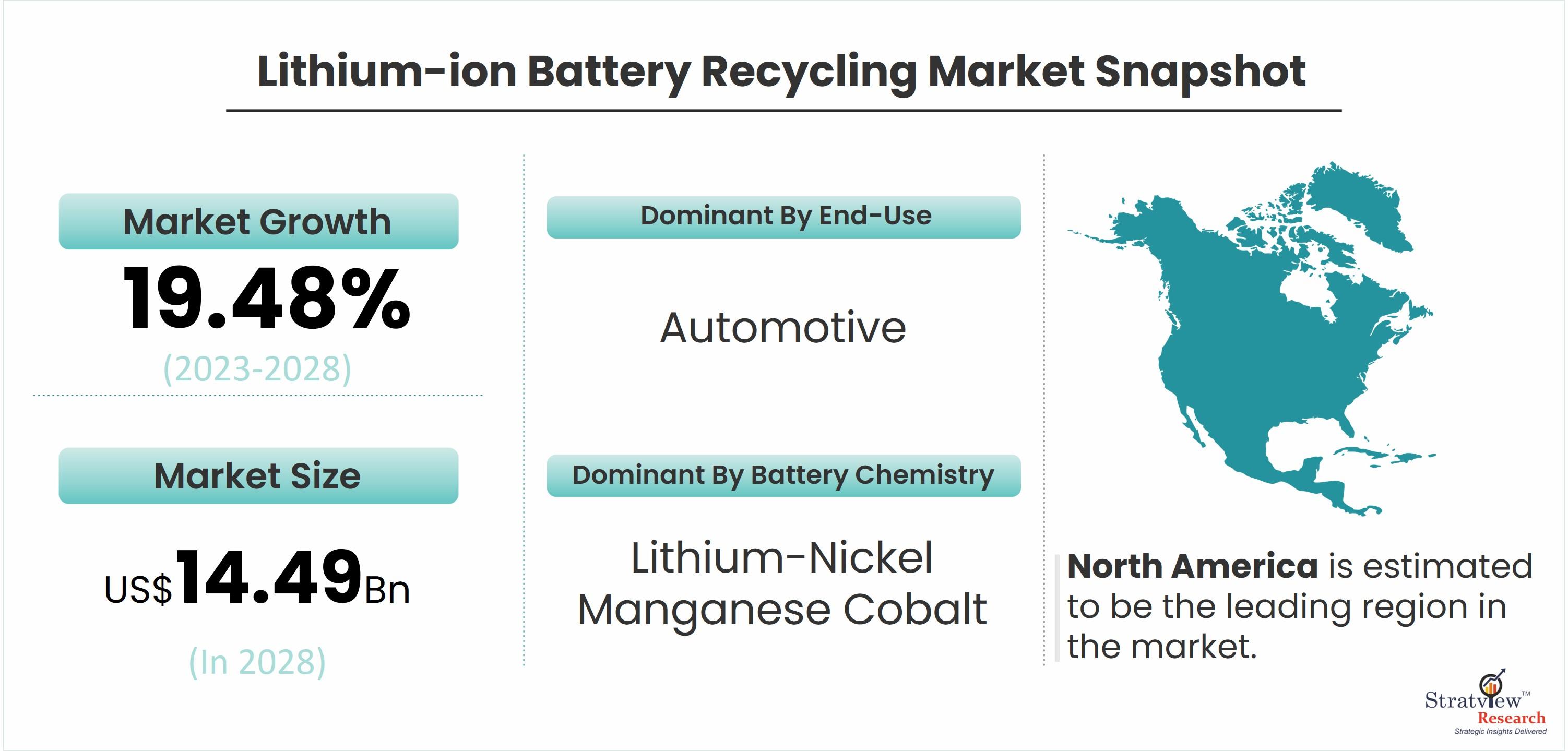From Waste to Power: The Growing Landscape of Lithium-Ion Battery Recycling

According to Stratview Research, the lithium-ion battery recycling market was estimated at USD 4.96 billion in 2022 and is likely to grow at a CAGR of 19.48% during 2023-2028 to reach USD 14.49 billion in 2028.
In an era defined by the urgent need for sustainable energy solutions, the proliferation of lithium-ion batteries has been both a boon and a challenge. While these batteries have revolutionized the way we store and utilize energy, their disposal at the end of life presents significant environmental concerns. However, amidst these challenges, a new industry is rapidly emerging – lithium-ion battery recycling. This article explores the burgeoning landscape of lithium-ion battery recycling, where waste is transformed into power, and sustainability takes center stage.
The Rise of Lithium-Ion Batteries:
Lithium-ion batteries have become the backbone of modern energy storage systems, powering everything from smartphones and laptops to electric vehicles and renewable energy grids. Their high energy density, long cycle life, and rapid charging capabilities have made them indispensable in our quest for cleaner, more efficient energy solutions. However, as the demand for lithium-ion batteries continues to soar, so too does the need for sustainable end-of-life management solutions.
Challenges of Battery Waste:
The disposal of lithium-ion batteries presents a myriad of challenges. Traditional disposal methods, such as landfilling or incineration, not only waste valuable resources but also pose risks to human health and the environment. Lithium-ion batteries contain toxic chemicals and heavy metals that can leach into soil and water, contaminating ecosystems and endangering wildlife. Additionally, the extraction of raw materials for new batteries contributes to environmental degradation and resource depletion.
Enter Lithium-Ion Battery Recycling:
Lithium-ion battery recycling offers a sustainable alternative to traditional disposal methods. By recovering and reusing valuable materials from spent batteries, recycling not only reduces the environmental impact of battery waste but also conserves precious resources. The process typically involves disassembly, shredding, and sorting of batteries to separate the different components, followed by extraction and purification of metals such as lithium, cobalt, nickel, and copper.
The Growing Market:
The lithium-ion battery recycling market is experiencing rapid growth, driven by several factors:
Environmental Concerns: Heightened awareness of environmental issues and the need for sustainable waste management solutions are driving interest in battery recycling.
Regulatory Pressure: Governments around the world are implementing regulations and incentives to promote battery recycling and reduce reliance on raw materials.
Technological Advancements: Innovations in recycling technologies are improving the efficiency and economics of the recycling process, making it more attractive to investors and manufacturers.
Circular Economy Initiatives: Battery recycling is a key enabler of the circular economy, where materials are reused, remanufactured, and recycled to minimize waste and maximize resource efficiency.
The Power of Recycling:
Lithium-ion battery recycling is not just about waste management – it's about harnessing the power of recycling to create a more sustainable and resilient energy ecosystem. By closing the loop on battery production and disposal, recycling supports a circular economy where materials are continuously cycled and reused, reducing the need for raw material extraction and minimizing environmental impact.
Looking Ahead:
As we look to the future, the landscape of lithium-ion battery recycling holds immense promise for sustainability and innovation. With continued investment in recycling infrastructure, research and development, and regulatory support, we can unlock the full potential of recycling to power a cleaner, greener future. From waste to power, lithium-ion battery recycling is not just a solution – it's a transformative opportunity to reshape our energy landscape and build a more sustainable world for generations to come.
- Questions and Answers
- Opinion
- Motivational and Inspiring Story
- Technology
- Live and Let live
- Focus
- Geopolitics
- Military-Arms/Equipment
- Security
- Economy
- Beasts of Nations
- Machine Tools-The “Mother Industry”
- Art
- Causes
- Crafts
- Dance
- Drinks
- Film/Movie
- Fitness
- Food
- Games
- Gardening
- Health
- Home
- Literature
- Music
- Networking
- Other
- Party
- Religion
- Shopping
- Sports
- Theater
- Health and Wellness
- News
- Culture

